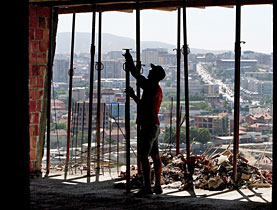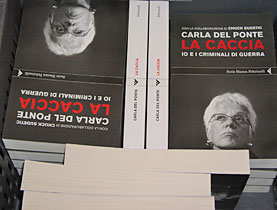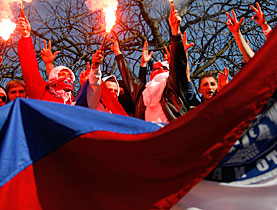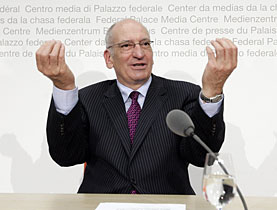Switzerland to increase Kosovo rebuilding aid

Switzerland will pledge SFr77 million ($74.6 million) over three years at an international donors' conference for Kosovo, the country's development agency announced.
The statement from the Swiss Agency for Development and Cooperation (SDC) came one day ahead of a meeting to fund the former Serbian province, organised by the European Commission and to be held in Brussels on Friday.
The Swiss commitment is part of an initiative for development and debt relief that newly independent Kosovo hopes will total €1.5 billion (SFr2.4 billion).
“Switzerland has a strong interest in establishing stability in Kosovo and for the new nation, as well as the entire western Balkans,” the SDC said in a statement.
The contribution is SFr16 million higher than its previous commitment, the SDC said. Roughly SFr21 million will be allocated to the environment sector and SFr8 million for energy under the plan.
Switzerland will also give SFr13 million for initiatives supporting the rule of law, democracy and good governance.
Switzerland will channel its contribution through the SDC, the State Secretariat for Economic Affairs (Seco) and the Federal Migration Office. The total commitment to Kosovo for 2008, including SFr37.5 million from the Defence Ministry, is close to SFr60 million.
Military funding from Switzerland is not included in Friday’s package. Earlier this year, parliament extended the country’s military mandate until the end of 2011.
Currently, 220 Swiss soldiers are serving in Kosovo as part of Nato’s 16,000 strong peacekeeping force in the Balkan state.
Civilian projects
Switzerland is supporting civilian projects to promote the local economy, democratic institutions, public infrastructure and cooperation on immigration issues. The government has said it is also concerned about the future of minority groups, especially Serb communities in northern Kosovo.
“We are confident that the new state following its independence declaration will head in the right direction,” Swiss ambassador Christian Meuwly told the Swiss news agency.
Switzerland is one of 40 states that have recognised the independence of Kosovo.
The United Nations Interim Administration Mission for Kosovo (Unmik) has decided to slowly transfer its tasks to the European Union.
EU mission
Switzerland will also assign experts to take part in the EU’s Rule of Law Mission in Kosovo (Eulex). Its main aim is to assist and support the Kosovo authorities in the rule of law area, specifically in the police, judiciary and customs.
Meuwly said adjustments would also be required in the area of immigration. He said the new state lacks the expertise at the executive level in order to maintain international relations.
Switzerland has offered to help train local personnel, for example, to improve issuing identity papers. This is in Bern’s interest, Meuwly explained, since the 150,000 Kosovar Albanians residing in Switzerland should have access to adequate Kosovo consular services.
EU and US
The EU pledged €500 million for Kosovo on Friday.
A spokeswoman for the European Commission said the EU’s 27 member states were also expected to make their own pledges on top of that.
The United States, Kosovo’s main Western ally, committed $400 million (SFr412 million) with $150 million earmarked for debt servicing. Germany, the second-largest donor, said it would give €100 million.
The Albanian-majority territory in February declared independence from Serbia following nine years as a UN protectorate. Switzerland opened an embassy in the capital, Priština, one month later.
swissinfo with agencies
Kosovo had been run by the United Nations, backed by Nato troops, since the alliance’s 1999 bombing campaign against Serb forces.
It unilaterally declared independence from Serbia on February 17, 2008 after internationally led talks to reach a mutual agreement on its status failed.
Switzerland recognised Kosovo’s independence ten days later.
In 2005, it was the first state in the world to call for independence for Kosovo.
Today, Switzerland is home to over 150,000 Kosovars.
Switzerland’s sizeable community from the Balkans includes 270,000 from Kosovo, Macedonia and Bosnia-Herzegovina.
Kosovo had for decades been the poorest part of Yugoslavia and is only slowly recovering from the damage of its 1998-1999 war. Around 40 per cent of its overall population is unemployed.
The country’s development plan for 2008-2011 forecasts a shortfall of €1.4 billion.
Serbia lost control of what was its southern province in 1999, when Nato drove out Serb forces accused of mass killings of civilians in a two-year war on separatist guerrillas.
Landlocked Kosovo faces an uphill battle in getting back on its feet because Serbia, with strong Russian backing, remains vehemently opposed to its split from Belgrade. Serbia recalled its ambassador to Bern when Switzerland opened its Kosovo embassy in March.
Serbia and Russia have vowed to block Kosovo from joining international institutions such as the United Nations through which it could get more funding and aid.

In compliance with the JTI standards
More: SWI swissinfo.ch certified by the Journalism Trust Initiative



You can find an overview of ongoing debates with our journalists here. Please join us!
If you want to start a conversation about a topic raised in this article or want to report factual errors, email us at english@swissinfo.ch.